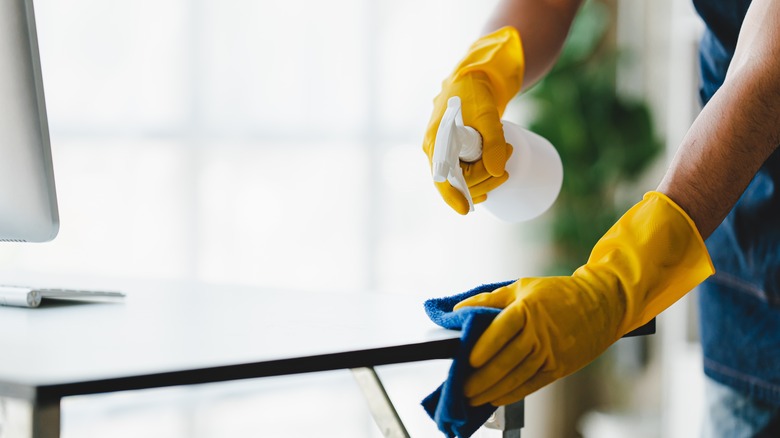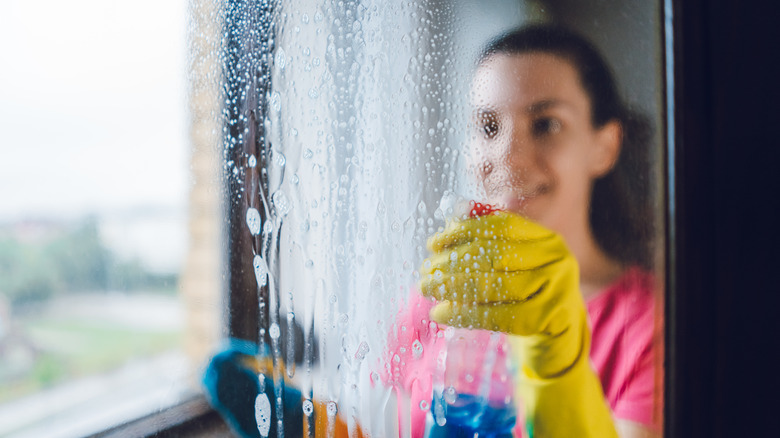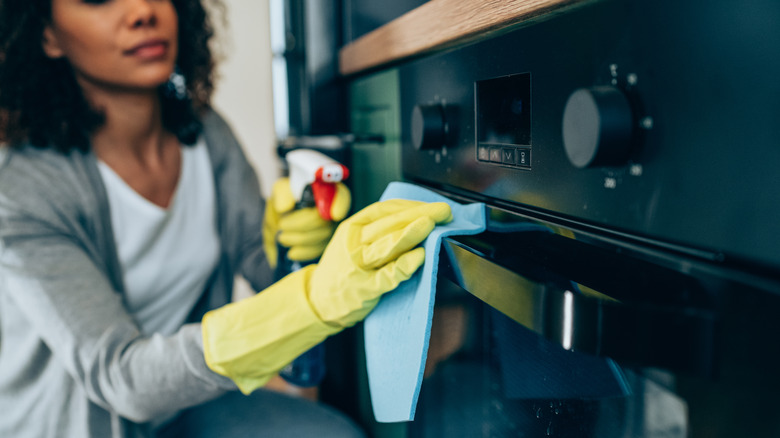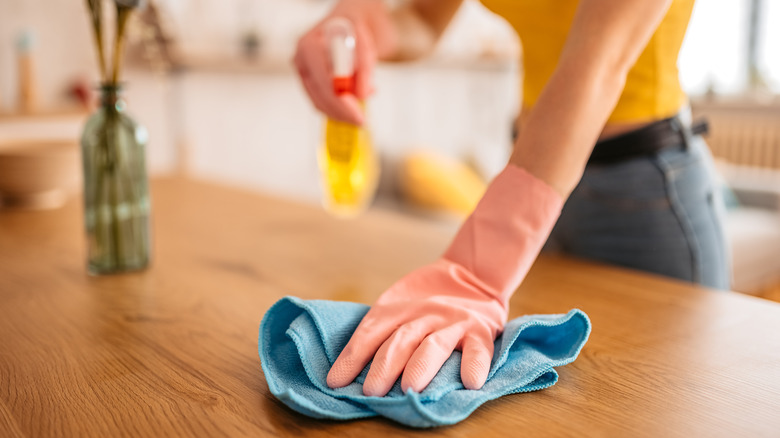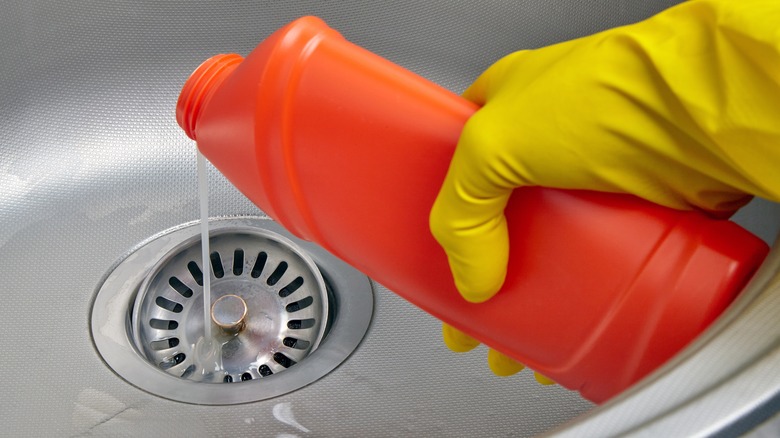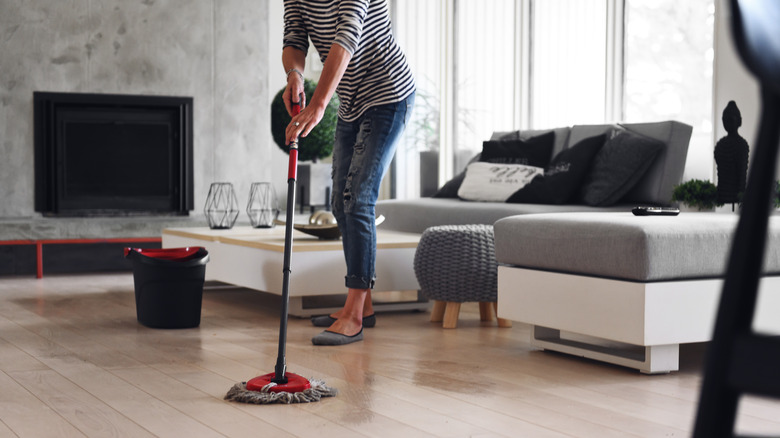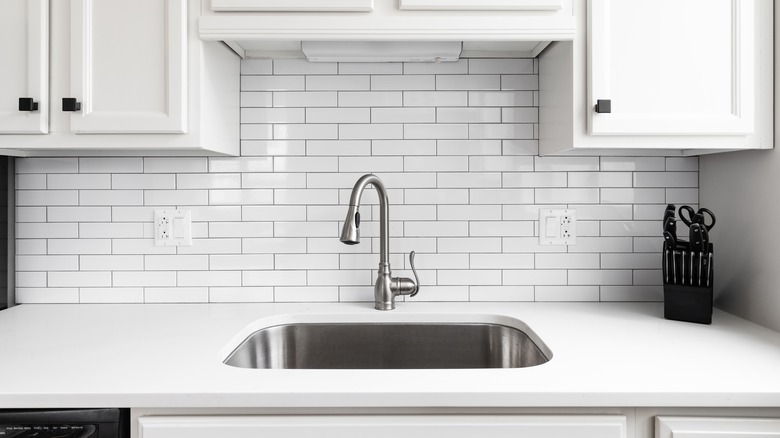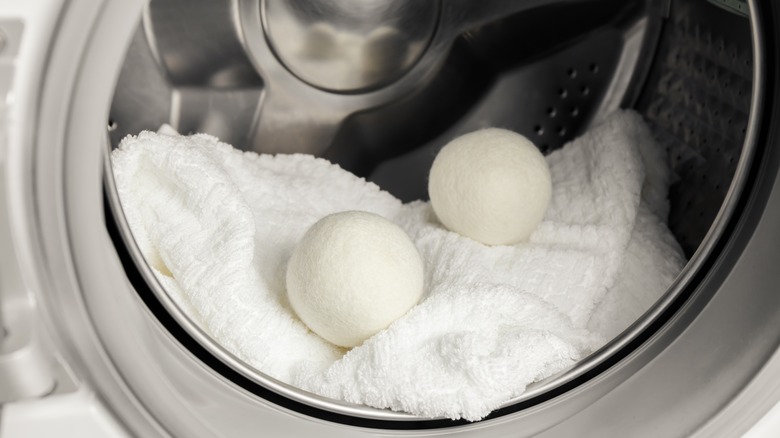Popular Cleaning Products That Aren't Worth Buying
With the rise of #cleantok (that's cleaning TikTok, for the uninitiated), there's more incentive than ever to go out and purchase a ton of cleaning products. There are thousands of videos of people creating extravagant cleaning concoctions with an abundance of different products you likely never felt the need to check out before. It can be extremely tempting to feel like you have to buy into the cleaning hype and get an individual product for every item or surface in your house. Oven cleaner, drain cleaner, glass cleaner — the list goes on.
The truth is, while #cleantok may tell you otherwise, you definitely do not need a cupboard stacked full of products for every little area. Instead, DIY your own cleaning products with household items you already have to save money and a shopping trip. What's more, you can avoid using an overabundance of chemicals from the numerous products available. Here are some of the most popular cleaning products you may have unnecessarily bought, and what to use in place of them to keep your home sparkling clean.
Glass cleaner
Nobody wants their glass furniture to end up with streaks that are visible from a mile away, but buying a product that says it's specially designed for glass could be a huge drain on your bank account, especially if the results that aren't so special. Speaking to The Spruce, cleaning specialist Sarah San Angelo (aka The Cleaning Lady) shared, "Glass cleaners...are a waste of money, and they can be dangerous if accidentally mixed with other cleaning supplies." You're much better off creating your own glass cleaner that will be far more affordable and less toxic.
To make your own homemade window cleaner that works well on all glass surfaces, reach for vinegar, water, and rubbing alcohol. Mix together 1 cup of water, 1/4 cup of rubbing alcohol, and 2 tablespoons of vinegar and put the mixture into a spray bottle. Alternatively, if you don't have rubbing alcohol, San Angelo recommends creating a mix of equal parts distilled vinegar and water for an eco-friendly glass cleaning solution that will leave a streak-free shine.
Oven cleaner
Cleaning your oven is important, but buying oven cleaner? Not so much. Many products formulated for cleaning your oven contain heaps of chemicals that may not wash out completely, leaving you running the risk of contaminating your food when you turn the oven on. Most ovens also have a self-clean feature built-in that will do a job of cleaning your oven without any unnecessary chemicals.
If you want to follow up the self-clean cycle for a more thorough clean, or if your oven doesn't have that feature, cleaning professional Sergio Sanchez shared with Well+Good how to get your oven sparkling using just dish soap, vinegar, and baking soda. You'll need to mix one part dish soap and one part vinegar together before adding in baking soda gradually until you make a paste. "Use a sponge to apply a liberal amount of paste to the walls of your oven, including the oven door," Sanchez shared. "For best results, let it sit for 30 minutes and then use the abrasive side of the sponge to wipe away the paste along with all grease and grime."
Dusting spray
If you're dusting your home, reaching for a dusting spray may seem like the logical thing to do. However, this is a great example of a product you don't need. To get rid of all of those pesky specks of dust, as well as any lingering dirt, ditch the dusting spray. Not only are dusting sprays unnecessary for a good clean, but they can also cause waxy build-up that will leave a film over your furniture and a greasy feel. They can seem effective in the short term, but in the long term you may regret using them.
Rather than buying a bottle of Pledge or Endust, simply reach for a microfiber cloth and some water the next time you dust. This super simple method will leave your surfaces free of dirt and dust without the risk of any build-up. Simply ensure you move everything (yes, including ornaments and trinkets) before you start dusting and then dip your microfiber cloth in some water. Wipe it over the surface and then use a dry microfiber cloth to remove any remaining water.
Drain cleaner
Unlike dusting sprays, drain cleaner is actually a fair product to have in your cleaning cupboard to prevent a clogged drain, as well as the expense of someone having to come out to fix it. However, it's important to tread carefully, as pouring multiple of these products down the drain at once will create a chemical reaction that's dangerous to your health. As cleaning expert Sergio Sanchez told Well + Good, "most drain cleaners use powerful chemicals that can be hazardous when inhaled."
Rather than risking it, Sanchez recommends using two household ingredients you probably already have: baking soda and vinegar. Combine 1/3 cup of each and pour the mixture down the drain. These specific ingredients together will trigger a powerful chemical reaction that isn't hazardous for your health, but should get rid of any blockages in your drain. Don't forget to pour some boiling water down the drain afterward for best results.
Floor cleaner
Much like window and oven cleaner, there's nothing wrong with buying specialist products, but you definitely don't need to get cleaner specifically labelled for the floor. Via The Spruce,Toby Schultz, CEO of cleaning service Maid2Match, shared, "Your floor cleaner is likely not more effective than good old soap and water. Unless your floor is made of special material that needs a specific cleaner, you may be better without it. Typically you can get away with just using water or a single multi-purpose cleaner."
The exceptions are special types of flooring like hardwood or natural stone tile, which require specialized cleaning. To clean hardwood floors, sweep or vacuum at least weekly. For a more thorough clean, use a slightly damp mop monthly. When it comes to stone floor, natural stone tiles like limestone, marble, and granite are susceptible to being damaged by harsh cleaning products. Instead, use a broom to sweep up any dust and a vacuum to banish debris. Some stone flooring can tolerate mopping with water, but different types of stone will require different cleaning methods, so always make sure you know what's best for your specific floor.
Stainless steel cleaner
Stainless steel can look cloudy or get scratched if not maintained well, which is where stainless steel cleaner comes in. Still, like the other cleaners on this list, it's simply something you don't need. There are plenty of ways to get your steel sink shiny again without breaking the bank on a specialized cleaner. One such way to clean your finishes is with dish soap. Yes, simple dish soap and a few cleaning tools are all you need to restore your stainless steel appliances.
In addition to dish soap, you'll need three microfiber cloths, a dish sponge (with a non-abrasive scrub side), and some warm water. Take one of the microfiber cloths and wet it to first wipe down the stainless steel. Then, go in with a second microfiber cloth, this time with a small amount of dish soap and some more water. While this method should get rid of most marks, use the dish sponge for any that stick around. Repeat the above method, but using the sponge instead of the cloth. Finally, go in with the third microfiber cloth to banish all remaining soapy residue. Once done, dry the appliance thoroughly.
Fabric softener
Though not technically a cleaning product in the typical sense, fabric softener is often used when washing your clothes. It may make your clothes smell nice, but there are a few reasons you should stop using fabric softener that aren't just because it can be pricey. Firstly, scent. The scent of fabric softener is one of its main selling points, but too much fragrance will cause sensitive skin to become irritated. While scentless fabric softener is available, it's best to still skip it if you have a skin condition like eczema. Secondly, per Real Simple, laundry expert Rechelle Balanzat explained that fabric softener "can potentially alter the state of the garment, making it less fluffy and more flat."
Don't risk your favorite sweater losing fluff. The next time you go to do a wash, opt for wool dryer balls as an alternative. Wool dryer balls will soften your garments, get rid of any lingering static, and are reusable, so you can do your bit for the planet by consuming less. If you miss the scent of softener, add a few drops of essential oils in with the dryer balls.
